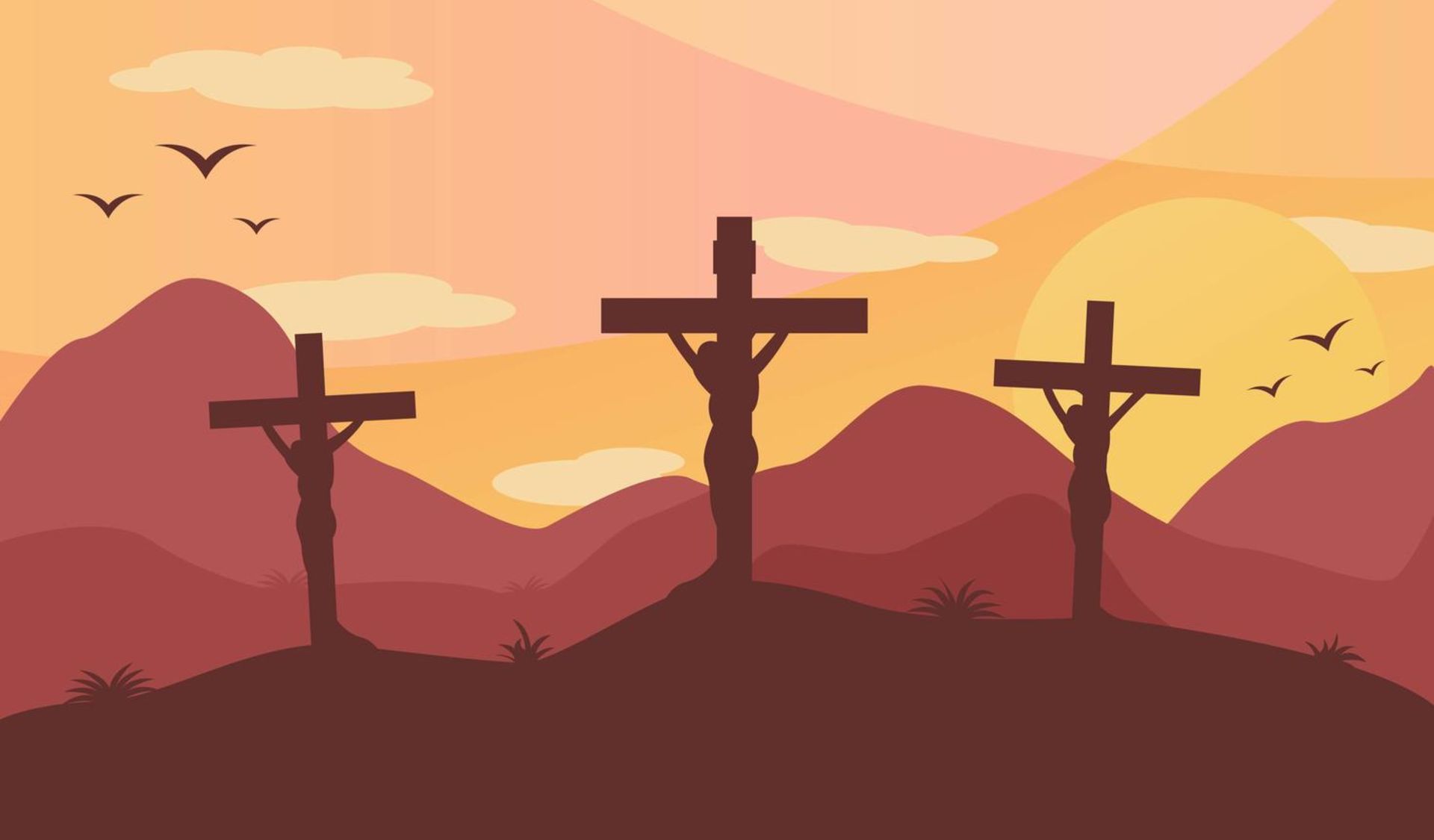Did God forsake Jesus on the Cross? A chilling thought! But one that does enter our minds.
On the cross, Jesus cried out, “Eloi, Eloi, lema sabachthani?”
(Aramaic for “My God! My God! Why have you forsaken me?”)
According to a line in a beautiful modern hymn, “The Father turned his face away”.
The earth-shaking question is: Did He?
Did the Father turn his back on Jesus in his hour of greatest need?
To be honest, I had till recently answered this question in the affirmative.
But, having seriously struggled with this heavy thought, I have changed my mind. Also, let me confess, that I feel inadequate to articulate the depths of the marvel and mysteries of the cross of the Saviour. A hundred sermons would be insufficient to aptly describe what happened on that first Good Friday.
However, we must grapple with the meaning of the cross, since the cross and resurrection are at the very centre of the Christian faith. There is no other symbol that adequately represents the followers of the Nazarene.
I may not convince all—so please feel free to disagree. All I ask is that you consider these thoughts; and we could still remain friends.
Does any text in the New Testament (apart from the aforementioned words of Jesus on the cross, to which we will soon turn our attention) explicitly say that the Father God had to turn his face away from Jesus, because our sins had been laid on him?
No.
He knew his disciples would scatter and abandon him; but not his Father. Instead, he said: “The time is coming when you will leave me all alone. Yet, I am not alone, for my Father is with me.
Then how do we interpret these words of Jesus, mentioned in the Gospels of Mark (15:34) and Matthew (27:46)? (These words are not found in Luke and John.)
Among the words that escaped the parched lips of the mutilated Messiah, were these words. Taken at face value, it is a cry of dereliction: The Father had apparently forsaken the Son.
In which case, the eternal bond within the Godhead, between the Father, Son and Spirit, was broken on the cross. Did that really happen? Was that even possible?
Did Jesus face the deepest unimaginable pain of the greatest abandonment? He could have borne the pain of his disciples running away, but, his Father too?
How else can we see those words of lament from the cross? I believe there is a better way to understand these words of Jesus on the cross.
First, as seen in the Gospels, Jesus always addressed God as “Father”.
Therefore, among the recorded words uttered from the cross, we hear: “Father, forgive them, for they do not know what they are doing” and, finally, “Father, into your hands I commit my spirit” (Luke 23:34, 46).
Thus, we should not be in a hurry to read the other words of Jesus (“My God! My God!”) as perfectly representing Jesus’ deep anguish of being abandoned by his Father.
Second, Jesus, well aware of both the absolute horror and the decisive victory of “the hour” (as John puts it), never ever spoke of his Father forsaking him.
He knew his disciples would scatter and abandon him; but not his Father. Instead, he said: “The time is coming when you will leave me all alone. Yet, I am not alone, for my Father is with me” (John 16:32).
Wholly submitted to his Father’s will in Gethsemane, Jesus was perfectly assured of his Father’s presence on Golgotha!
Now we may think: Since the sin of the whole world was on Jesus, how could a holy God look upon the horrible evil and sin. Now it is true, as Paul puts it: “God made him who had no sin to be sin for us, so that in him we might become the righteousness of God” (2 Cor 5:21). Yes, Jesus was the Lamb of God who was taking away the sin of the world.
The prophet Isaiah says: “Yet we considered him punished by God, stricken by him, and afflicted” (Isa 53:4b). That’s how we considered him. No wonder Paul went after those who believed in an “accursed Messiah”.
Jesus tasted death and the darkness of sin on behalf of the whole human race. He experienced the absolute and infinite darkness and degradation of sin.
God, by sending his Son as a sin offering, condemned sin in human flesh (Rom 8:3). Along with that, God took away our condemnation, and disarmed and triumphed over Satanic powers and authorities (Col 2:13–15).
What about us, with our petty religiosity and selfish lifestyle? God still reaches out to us and to this whole world in unbelievable grace and love.
But who says, a holy God cannot look at sin? I know a complaining prophet thought so (Hab 1:13). But, is that true? God loves the world—Yes! Though full of sin and evil. The giving up of his Son on the cross was God’s merciful idea (John 3:16).
God does not turn his face away from the world right now—does he? What about us, with our petty religiosity and selfish lifestyles? God still reaches out to us and to this whole world in unbelievable grace and love.
Third,—and this may be the clincher—Jesus was reciting the words of the Messianic Psalm 22. The psalm recounts the inspired words of the righteous sufferer, who expresses his lament to God—the pain and darkness of unjust present suffering, yet moving on to ultimate vindication and salvation.
The book of Psalms was the hymnal of Jesus. If you would have heard Jesus humming a song while working away in Joseph’s workshop, it was probably a psalm set to a simple tune.
On the cross, Jesus was reciting the words of Psalm 22, beginning with the opening verse. And then he would have worked his way through the psalm. Jesus would have learnt, early on, that such psalms revealed his calling to be the Suffering Servant who would deliver Israel.
Just read through Psalm 22. You cannot miss the many resonances to what Jesus is going through on the cross.
The bystanders shake their heads and mock him (Ps 22:6–8; Matt 27:41–44; Mark 15:29–30). He suffers terrible thirst (Ps 22:15; John 19:28). The soldiers cast lots for his inner garment, maybe to keep as a trophy (Ps 22:18; Matt 27:35).
While the psalmist says metaphorically that “they pierce my hands and my feet” (Ps 22:16), Jesus’ body was literally pierced—and the marks endure after the resurrection.
But the psalm continues: “For he has not despised or scorned the suffering of the afflicted one; he has not hidden his face from him, but has listened to his cry for help” (Ps 22:24).
Jesus would declare God’s praise among his “brothers and sisters”—which is Psalm 22:22, but cited in Heb 2:12. The psalmist is quite confident that his God will vindicate him, and as a result, “the whole world will turn to the Lord and bow down before Him” (Ps 22:27).
God would vindicate the cross of Jesus, and the Holy Spirit would raise Jesus from the dead! And how does the psalm end? On the triumphant note: “He has done it” (22:31c)!
That was exactly Jesus’s victorious cry: “It is finished” (John 19:30)!
After this, Jesus could peacefully submit his spirit to the hands of his Father (Luke 23:46).
The Father was right there with Jesus. As Jesus expected.
Fourth, see the insight of the apostle Paul and others:
“All this is from God, who reconciled us to himself through Christ and gave us the ministry of reconciliation: that God was reconciling the world to himself in Christ, not counting people’s sins against them” (2 Cor 5:18–19).
So, where was God when Jesus was on the cross? He was in Christ! He too suffered with Jesus!
[Jürgen Moltmann (The Crucified God, 1972) wrote about a God who participates in solidarity with the suffering of his creatures, so as to ultimately redeem them.]
In some marvellous and mysterious way—too deep for me to articulate here—the Triune God was involved in the redemption of the world on the cross of Jesus. The eternal bonds within the Godhead could never be broken.
The writer to the Hebrews says that Christ offered himself to God through the eternal Spirit (Heb 9:14).
Friends, in ways we will never fully fathom, the love of God has been fully revealed on the cross of Jesus. The way of sacrificial love. And that love is poured into our hearts through the Holy Spirit (Rom 5:5).
In the words of the theme song of the early 20th century Welsh revival:
On the mount of crucifixion,
Fountains opened deep and wide;
Through the floodgates of God’s mercy,
Flowed a vast and gracious tide.
Grace and love, like mighty rivers,
Poured incessant from above,
And heaven’s peace and perfect justice,
Kissed a guilty world in love. The Father never abandoned Jesus. He will never abandon you!







